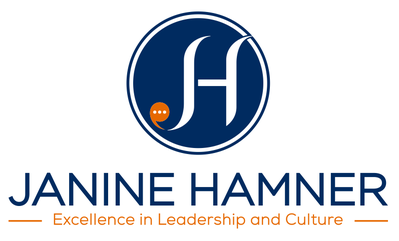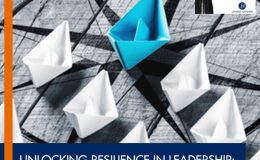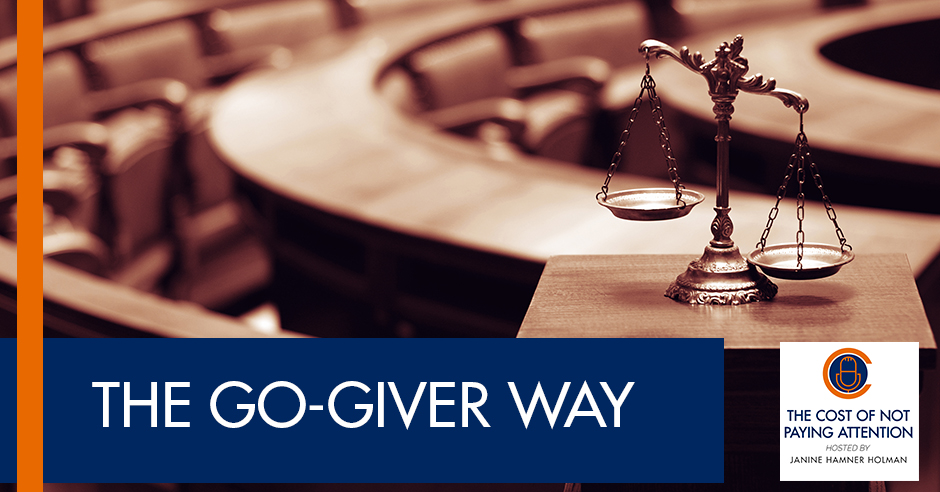
It isn’t about us. It’s about them. This is what we should constantly pay attention to, according to Bob Burg, the coauthor of the international bestseller, The Go-Giver. It’s easy, as human beings, for us to forget that and focus on ourselves with good intent. We love our product or service, and we think everyone should buy them, but that’s not how it works. In this engaging interview, Janine Hamner Holman and Bob talk about the Five Laws discussed in his bestselling book, as well as lots of other things, including what gets in the way of us humans being great at receiving and the power of authenticity. You can find out more about Bob at Burg.com and the community of Go-Givers that Bob has created at https://gogiversuccessalliance.com.
HOST: Janine Hamner Holman | Janine@JandJCG.com | LinkedIn, Facebook, and Twitter | Subscribe to my Newsletter! Book me to Speak!
—
Listen to the podcast here:
The Go-Giver Way
A Conversation With Bob Burg
What am I paying attention to? The impact of stories. I’ve been thinking a lot about how much our brains are wired for stories rather than the facts and figures that often we want to rely upon but that they’re not as meaningful and they’re not as memorable to people. That’s because of how our brains are set up, which brings me to our guest. The first book that I became aware of that Bob has co-authored with John David Mann is called The Go-Giver. Bob is an amazing author. He’s an amazing speaker. When I told several of my closest friends that I was having the opportunity to have a podcast episode with Bob Burg, we all geeked out together. Bob, you should know that each one of them said to me, “You have to tell him hi for me and that I’m his biggest fan.” You have many biggest fans out there.
Thank you. That means a lot to me. That’s something I never take for granted. I appreciate that greatly. Please tell them hello back and I’m their biggest fan.
Oh I love it because that’s exactly the essence of Bob Burg and of the Go-Giver. Bob is a sought-after speaker at company leadership and sales conferences, where he shares about this Go-Giver platform and talks with everyone from today’s business leaders and broadcast personalities to even a former US president. He’s the author of a number of books on sales, marketing, and influence, with his total book sales of well over a million copies sold.
I bought three copies of his The Go-Giver: one for me and two to give away! I also have The Go-Giver Leader, which again, Bob authored with his co-author John David Mann. That first book, The Go-Giver, sold 975,000 copies and has been translated into 29 languages. The newest parable in the series is The Go-Giver Influencer. Bob knows well about the power of stories. These are all parables that help us to understand the opportunity for giving and the five laws that he’s laid out. Welcome, Bob.
Selling is nothing more than discovering what the other person wants, needs, or desires and helping them get it. Share on XWhat an honor and pleasure to be with you. Thank you for having me.
I’m so excited to be here with you. To get us going, the first question that I ask all my guests is, what’s something that you’ve become aware of that you or other people weren’t paying attention to? Either intentionally not paying attention to it or unintentionally, unconsciously not paying attention to?
It’s something I’ve studied for a long time, although as a human being, I have to do my best to stay aware of it consciously. That is the understanding that people don’t do things for our reasons or because we want them to. In other words, it’s not about us, it’s about them. Intellectually, we all understand that, and yet, how often do we see salespeople, especially those who are talking about their product or their service about how, “I’m this and I’m that?” Most of it goes right through that other person’s mind because they don’t care.
When I was speaking a lot at conferences, I would often begin by telling salespeople by saying, “Nobody’s going to buy from you because you have a quota to meet.” They’re not going to buy from you because you need the money or even because you’re a nice person. They’re going to buy from you only because they believe they will be better off by doing so than by not doing so. That’s the only reason anyone should buy from you, from me, or from anyone. It’s the only reason why someone should employ us. It’s the only reason why someone should offer us a job and it’s the only reason about anything because our focus is on them.
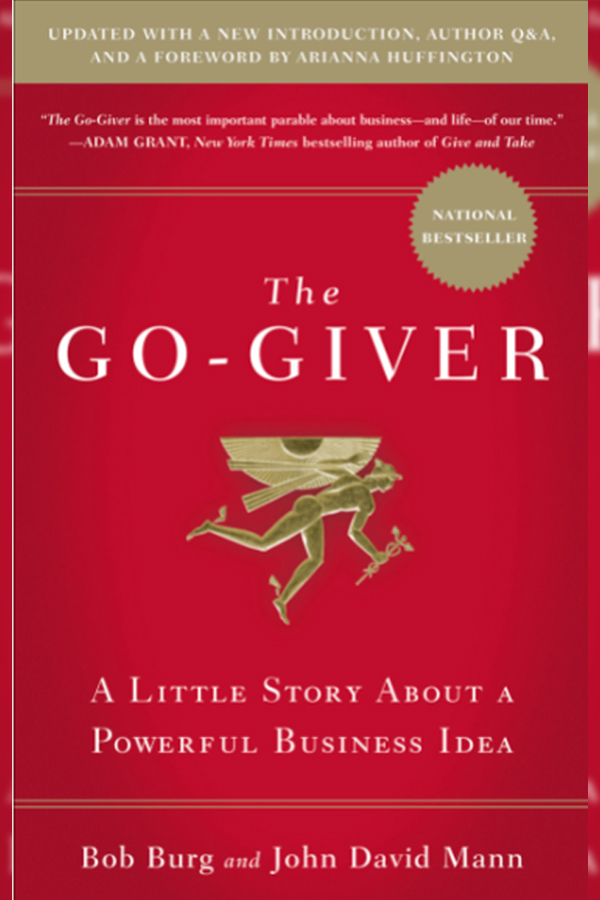
The Go-Giver: A Little Story About a Powerful Business Idea
When you think about it, selling is nothing more than discovering what the other person wants, needs, or desires, and helping them to get it. It’s easy, as human beings, for us to forget that and focus on ourselves with good intent. We love our product or service. We think that we do a great job and we think everyone should buy… but that’s not how it works. That’s the biggest thing we need to constantly and continually pay attention to. It isn’t about us. It’s about them.
I love that and I and I love how clear you are about how hard it is for humans to remember that. Hopefully, we are all the center of our own universe but we get into a place of selling. I think it’s Daniel Pink who has the book about how we’re always selling. We’re always selling something. I’m selling my husband on what we’re going to have for dinner. We’re always selling as human beings. The more that we can lean into what it is that benefits other people, what it is that other people are seeking, the more we can find commonality and the more successful we can all be.
Absolutely. That’s the name of the game.
Let’s get into it a little bit. For anybody out there who has not read the book yet and I would highly recommend The Go-Giver, it’s easy to read. It’s completely engaging and a quick read. Can you give us a quick review of the five laws that you and John share in the book?
Sure. It’s based around a simple premise. When you think about it, we’ve both been hitting on here and that is shifting your focus, this is where it all begins, from getting to giving. When we say giving in this context, we simply mean constantly and consistently providing immense value to others. Understanding that doing so is again not only a more fulfilling way of conducting business, it’s the most financially profitable way as well. And not in some out there, woo-woo type of magical and mystical reasons. It makes rational and logical sense when you’re that person who can take your focus off yourself and place it onto helping others, help them discover and determine what they want.
Your true worth is determined by how much more you give in value than you take in payment. Share on XHelping them and helping them work through their issues and challenges. Helping them to find new opportunities to improve their lives or their business, whatever it is. Also, helping to bring them closer to happiness in some way because of that focus, people feel good about you. People want to get to know you. They trust you. They want to be in a relationship with you. They want to do business with you directly, if that’s appropriate and if they need what you’ve got… but they definitely want to be your personal walking ambassador and tell the world about you.
When you do this, you’re creating what we call Benevolent Context for Success. The five laws are the laws of value, compensation, influence, authenticity, and receptivity. The first one, The Law of Value, begins with understanding the difference between price and value where the price is a dollar figure, a dollar amount. It’s finite. Value is the relative worth or desirability of a thing – of something of use to the end-user or beholder. In other words, what is it about this thing, this product, service, concept, idea, what have you, that brings so much worth to another person that they will willingly exchange their money for it and be glad, be ecstatic, that they did while you make a healthy profit?
A quick example I like to use because it’s fairly tangible. If you were to hire an accountant to do your taxes, and she charged you $1,000 – that’s her fee or her price. If she saves you $5,000, and if she provides you with countless free time that you wouldn’t have had otherwise because she’s doing that work for you. If she provides you and your family with the security and the peace of mind of knowing that was done correctly, she gave you well over $5,000 in value in exchange for that $1,000 fee.
That’s why we say, “Your true worth is determined by how much more you give in value than you take in payment.” You’re not losing money because that $5,000 that you that she saved you all the time, that’s great. That’s worth tons to you. The $1,000 that she charged that she earned was well worth it to her. To her, it was well worth her exchanging her knowledge, wisdom, time, energy, carrying, and everything for that $1,000 fee. Both of you came out way ahead of where you were. That’s the law of value.

The Go Giver: Giving simply means constantly and consistently providing immense value to others.
Law number two, the Law of Compensation says your income is determined by how many people you serve and how well you serve them. Law number one says to give more in value than you take in payment law. Number two tells us that the more people whose lives you touch with that exceptional value, the more money with which you’ll be rewarded. Your accountant did a great job of giving you more in value than she took in payment while making a healthy profit. If you’re her client, you’re happy with her. You would do business with her again and you probably would refer her and introduce her to a lot of people who need her help.
Our accountant is quickly amassing that army of personal walking ambassadors. She continues to add that exceptional value to the lives of more and more people. Her income will continue to grow and grow. In the story of The Go-Giver, Nicole Martin, the CEO, was telling Joe, the protégé, that law number one represents your potential income but law number two represents your actual income. As important as value is in and of itself, it’s the number of lives you impact with that value that equals your income. We could say exceptional value plus significant reach equals high compensation.
Law number three is the law of influence. This one simply says, “Your influence is determined by how abundantly you place other people’s interests first.” It sounds counterproductive. It sounds almost Pollyannaish! But then you think about the greatest leaders, top influencers, highest consistent money earning salespeople, this is simply how they run their lives and conduct their businesses. They’re always looking out for the interests of the other person.
I want to clarify and qualify that statement because this is important and can easily be misunderstood. When we say to place the other person’s interests first, we don’t mean you should be anybody’s doormat, a martyr, or self-sacrificial in any way. Not at all. It’s simply understanding that, as several of the mentors in the story told the protégé, the golden rule of business and sales is that all things being equal, people will do business with and refer business to those people they know, like, and trust. There’s no faster, more powerful, or more effective way to elicit those feelings toward you in others than by genuinely moving from that “I focus” or “me focus” to “another focus.” Looking to Sam, one of the mentors in the story, he advised Jill, “Make your win all about the other person’s win.”
Law number four is the law of authenticity. This one says, “The most valuable gift you have to offer is yourself.” In this part of the story, one of the mentors, Deborah, shared an important lesson she learned in her career: As important as all your skills are in the world, the sales skills, technical skills, people skills, as important as they are (and they are indeed important!), they’re also all for naught if you don’t come at it from your true authentic core. When you do, when you show up as yourself, day after day, week after week, month after month, people feel good about you. They feel comfortable. They feel safe with you. Why shouldn’t they? They know who they’re getting every time they see you because you’re authentic. You’re going to be consistent. You’re going to be the same person every single time. That’s when the “know, like, love, and trust” relationship begins to bloom.
The more people whose lives you touch with that exceptional value, the more money with which you'll be rewarded. Share on XTo be authentic, to show up authentically, we need to be able to embrace our authentic value. We need to know that as human beings, we bring great value to the table naturally but we also have to be aware of what I call our market value. I define market value as that combination of strengths, traits, talents, and characteristics that allows a person to give value to the marketplace in such a way that they will be rewarded for it. We all have these strengths. Of course, we all have weaknesses too. We need to know the different weaknesses. Some weaknesses can be ignored because they’re not important. Some need to be mitigated and controlled. Other weaknesses need to be turned into strengths if we’re going to reach our potential. We need to be aware of those.
We also do need to be aware of our strengths so that we can lead with those strengths. The challenge with this is that, as human beings, we’re emotionally close to ourselves. It can be difficult to acknowledge and embrace the greatness we have within us, especially because we see the world through our own eyes – as everybody else does. We assume that we’re good at this and everybody else does it too and can do it too. It’s not true! When we don’t understand and embrace those assets of value, this is when we undercharge, we don’t value ourselves enough. We take anything we can get because we don’t feel we’re worthy. It’s important to get with an executive trainer such as you, Janine, who can help people by caring about them but not being emotionally involved in their lives. It’s important to be able to understand your strengths, those elements of value that you possess, so that you can come at it in an authentic way.
Law number five is the law of receptivity. This one simply says that the key to effective giving is to stay open to receiving. This means nothing more than understanding that you breathe out but you also have to breathe in. It’s not one or the other. You breathe out carbon dioxide and you breathe in oxygen. You breathe out, which is giving the value. You breathe in, which is receiving. Neither is more important than the other. Both are important. The challenge is that the messages that we receive from the world around us, often from the time we’re born, and the messages from the outside world, whether it’s our environment, schooling, news media, television, or whatever have you. They feed us many negative and horrible messages when it comes to prosperity, money, business, and so forth. It can get into the unconscious and it can make us feel that there’s an issue with receiving. We stop ourselves, whether it’s personal worthiness issues or the messages from the world around us about how people with money must have done something wrong. It sounds illogical but you get this message all the time.
That’s why we like to say that despite the messages from the world around us, giving and receiving are not opposite concepts. They are simply two sides of the same coin and they work in tandem. It’s not: Are you a giver or a receiver? It’s more a giver AND a receiver. You know the way life works, the giving has to come first. We plant before we harvest. We sow before we reap. We give before we receive. That’s how it works. When we can do that, when we can find new, more, better, creative ways to give more in value than we take in payment, to touch the lives of more people with the immense value we provide, to place the interest of others first, to act from our true authentic core. We’ve created the benevolent context for our success and to receive. What we need to do is make sure we allow that receiving, that we receive with gratitude.

The Go Giver: The way life works, the giving has to come first. We plant before we harvest. We sow before we reap. We give before we receive.
I love your frame for all of this. As you’ve been talking through these different laws, there have been various stories and questions that have been activated within me. Let’s start at the end first. I have a dear friend who has been diagnosed with cancer. I firmly believe she is going to be fine. She firmly believes she’s going to be fine. Everybody’s got a great attitude. But she doesn’t live nearby and we are still in the midst of a pandemic. So I said to her, “How would you love to be supported? Would you love it if I called you once a week? Would you love it if I sent you little photographs? Would you love it if I sent you flowers every two weeks? Would you love it if I sent you flowers and a bottle of wine every two weeks?”
I kept throwing out these ideas as they occurred to me. Her response was, “No one has ever asked me that question before. How would I love to be supported?” In the end, she said, “I don’t know. I’ve never thought about it. I don’t know what I feel comfortable with receiving. Let’s start with whenever you think of me, send me a text.” I’ve been working on doing that…and making sure that I create some routine around it. And, what it brings up for me how challenged a lot of us are in this area of receiving.
Look how difficult it can be when someone gives you a compliment. We often immediately say, “No,” as opposed to saying, “Thank you so much.” It’s something that needs to be worked on. We can start small and build on our small successes. The receptivity muscle, if you will, is much like a physical muscle. If your goal is to lift 200 pounds, you don’t start the first day with 200 pounds. You start with ten pounds and then you go up to 15, 20, 40, and then 60. You work up that way, building your small successes. It’s the same thing with receptivity. Don’t put pressure on yourself to have to all of a sudden create this huge receptivity. Say “thank you” for those nice compliments. When someone holds the door open, say, “Thank you,” or pours coffee for you or whatever it happens to be. Start building upon those things. When you get a check, a small amount, medium amount, big amount, say, “Thank you.” You can thank God or thank the universe or whatever works for you.
I read a great book by a gentleman by the name of Ken Honda called Happy Money. What it’s about is the energy around money that people give it, both positive and negative. In Japanese, “thank you” is “arigato.” He did a thing suggesting that whenever you receive any money to say, “Arigato.” Whenever my business partner and I see a deposit into our bank account or we see someone sign up for our Success Alliance membership or whatever it happens to be, we text each other and it’s always, “Arigato.” It’s a muscle. It doesn’t matter whether it’s small or big. “Arigato,” because you’re thankful for receiving. It doesn’t matter the amount.
Your influence is determined by how abundantly you place other people's interests first. Share on XI would also make a big study of prosperity itself. There are people like Randy Gage, Sharon Lechter, Ellen Rogen, Bob Proctor, Ken Honda, David Nagel, and numerous people who write, speak, blog, video, and have books on prosperity. There are some of the older books, The Science of Getting Rich and Catherine Ponder’s The Dynamic Laws of Prosperity. There are tons of them out there. The reason why I say proactively study it is that we get all the limiting garbage all the time. Watch the news or go on Twitter or be in a conversation. That comes in naturally. To flush that, in a sense, we need to proactively put the positive thoughts, the positive energy about money, prosperity, and abundance.
I love how you’re connecting that directly into appreciation and starting to use that appreciation muscle. When someone pours you a cup of coffee, say thank you. Just doing the little things to start creating that internal receptivity.
If you think about it, success in and of itself can be defined in many ways, but it also covers many areas. There’s certainly a success in terms of financial, but there’s financial, physical, spiritual, mental, emotional, social, relational, and probably a dozen other areas of success. In all of these, we give energy to first, and then we receive. We need to allow ourselves to receive financially, physically, spiritually, and mentally. We all need to receive. That’s what it’s about.
I would like to ask you one more question before we wrap up here. I can’t believe how quickly this is all gone.
You make it easy. You make it a good conversation.
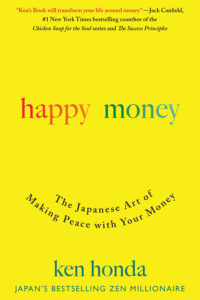
Happy Money: The Japanese Art of Making Peace with Your Money
Thank you.
When you were talking about value, I got to facilitate a conversation among a group of professional women who own their businesses, all functioning at a relatively high level. I did a poll and my question was, “You have a potential client who needs to get connected to somebody else. It’s a high-profile public figure. They want and are willing to pay you for your services to connect them. It’s going to take you ten minutes to do this. How much do you charge them?”
It was so fascinating to me speaking of value. This was going to be a huge value to the client. They could not make what they were trying to make happen without a connection to this individual. You were the best conduit that they had. You want to do other business with this client, but they are clearly not asking you for a favor. They’re clearly asking you for a commodity transaction, and because it was going to take you ten minutes, some people said, “I charge them $25.”
Some people said, “I charge them $5,000.” Some people said, “I charge them $10,000.” A few people said, “I wouldn’t charge them at all.”
I thought it was such an interesting span of answers because some of it was predicated on value and some of it was predicated on giving. When you come up with those kinds of challenges where you’re looking at the value that you’re returning to a client versus the opportunity to just give something that could be of enormous value, what are your thoughts on how you balance that out?
This is one of the few times that I will ever provide a definitive response. The answer is it depends… because there’s a lot more to it than just that.
The quick answer is if you can make a connection for someone, you make a connection. If you’re in the business where you’re connecting with someone, that’s what you do. You charge because that’s the commodity you’re in. That’s the value, but we’re not talking about that. We’re talking more that it’s not what you do. It’s someone with who you have a relationship, you’d like to do more business with but they also believe that you can connect them with someone who they need and so forth.
My quick answer would be no, you don’t charge them for it because that’s something that you do because you can. The fact that it takes ten minutes isn’t the issue. It’s the old story of the person who’s brought in, in the middle of a freezing night to fix the heater. They looked around and they tapped twice and they fixed it. He said, “That’s $1,000.” The person goes, “$1,000? It only took you ten seconds.” “The tapping was free. It’s my knowledge over ten years that’s $1,000. If you’d rather, I can turn it back off.”
No, it’s not the time. It’s the value that is the thing.
The most valuable gift you have to offer is yourself. Share on XIt comes down to what is it you’re looking to accomplish with this? If it’s a matter of, it’s congruent with your values to do a good thing to connect someone because you can, that’s what you do, and it’s who you are, you just do it. If you know that it’s something that’s going to be appreciated by that person, you certainly hope it is, but you’re not attached to it. If it’s something where this is totally not something you would do and you don’t necessarily have a connection with that other person. It’s going to take work and a lot of effort to get it.
Now you have to make a different decision. That’s not exactly your job description, but it’s something that you’re having to put work and effort into, and now, it might be something different. “If I was going to charge for it, though I would not charge $25.” Don’t do that. That’s playing much too small. You’re much better off just doing it. My quick answer is if you can make a connection with someone and that’s not what your job is, sure, you make the connection. It comes down to different things, too. It’s all a matter of different goals, intensity, and situations. There’s no one answer to that.
Isn’t that the way of life? It’s all about context.
Exactly. By the way, that goes back to the initial question you asked me, too. What’s something that people don’t pay attention to? What people don’t pay attention to are nuance and context. We want to see everything as black and white. If you’re a Democrat, all Republicans are bad. If you’re Republican, all Democrats are bad. If you’re a Republican, all Republicans are good. If you’re a Democrat, all Democrats are good. There’s no nuance to it. It’s either this or that.

The Go Giver: If you can make a connection with someone, and that’s not what your job is, sure, you make the connection.
What we need to do is start paying attention more to the fact that, in life it’s typically not black or white. Certain things have certain values. I learned a great thing from a book by a woman by the name of Annie Duke called Thinking in Bets. She also wrote a book about how to make decisions. She’s absolutely brilliant. In Thinking in Bets, what she talked about is we typically don’t have all the information before making a decision.
We want it but we rarely have it.
This is what she takes us through in her book, How to Decide. There are certain things we can do to create the context where we have the most information possible, but we still probably don’t have all the information. We need to make decisions based on not having all that information, having the best possible information, and understanding the cost-benefit analysis of doing this and what went right. She says, “If you look on Twitter, for example, or Facebook, how many people just make statements about something? Would they make that same statement if they had to bet $1 million that was correct?” No. Since I read her book, I started thinking more in that way. I’m loath to give an opinion as though it’s a fact without thinking to myself, “Would I say this thing if it was going to cost me $1 million if I were wrong?” That’s not a bad way to go about deciding whether to make a statement.
Oh how I wish we were all in a place where we could embrace that! One on the long list of things that I love and enjoy about my mother is that she lives her life in the world of gray. Nothing is black and nothing is white outside of some of our basic values and tenets. She loves the nuance. She loves the gray. She embraces the gray and the nuance. It’s such a magnificent way to move through the world, especially in today’s world where it seems we’re further apart as humans than we’ve ever been before.
The opportunity to lean into some of the things that your books talk about in terms of the five laws and in terms of being authentic, being our best selves, and being our best selves through that lens of being the giver. Being somebody who is not in it thinking about, “What can I get,” but more, “What can I give and where’s my opportunity to support other people?” If we all lived our lives that way, how magnificent? I grew up in a church and one of the things that people always talked about is that the kingdom of God is here. This is the kingdom of God that we are living in now. If we could all embrace that, think of how this kingdom of God could be different and magnificent.
The key to effective giving is to stay open to receiving. Share on XIt sounds like you had a magnificent mom who you learn from and you have been able to benefit from her wisdom, love, and thought processes. That’s a blessing.
One of the great blessings of my life, in fact. Bob, I could talk to you all day, but I know, unfortunately, both for myself and you and our readers, we don’t necessarily have all day. I want to go ahead and close this out. It has been a great joy and pleasure to have the opportunity to talk with you. I have enjoyed it immensely.
Thank you. I have loved being with you and it’s been a great conversation.
Thank you. Remember, great leaders, make great teams. Until next time.
Important Links:
- John David Mann
- The Go-Giver
- The Go-Giver Leader
- The Go-Giver Influencer
- Happy Money
- The Science of Getting Rich
- The Dynamic Laws of Prosperity
- Thinking in Bets
- How to Decide
- GoGiverSuccessAlliance.com
- www.Burg.com
About Bob Burg
 Bob Burg, coauthor of the international bestseller, The Go-Giver and a much sought-after speaker at sales and leadership conferences, is committed to inspiring the entrepreneurial spirit in us all. He shows that companies both large and small that conduct their businesses “The Go-Giver Way” are not only of much greater value to their customers; they are also significantly more functional, and profitable, as well.
Bob Burg, coauthor of the international bestseller, The Go-Giver and a much sought-after speaker at sales and leadership conferences, is committed to inspiring the entrepreneurial spirit in us all. He shows that companies both large and small that conduct their businesses “The Go-Giver Way” are not only of much greater value to their customers; they are also significantly more functional, and profitable, as well.
